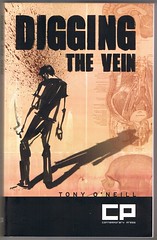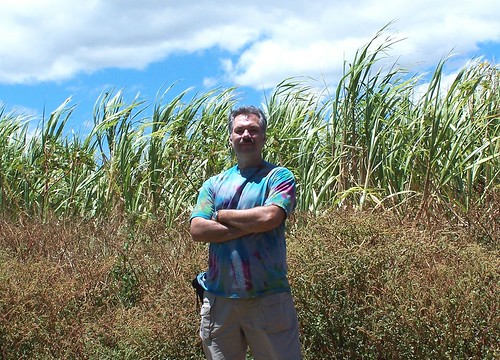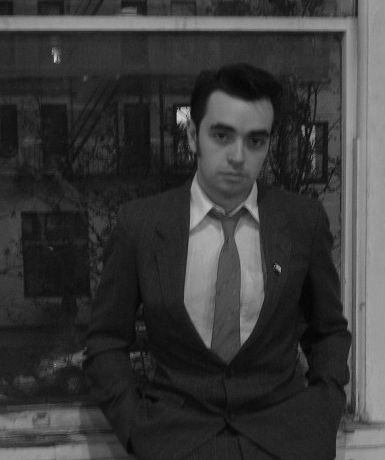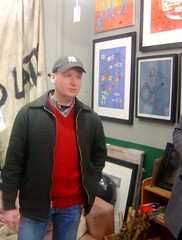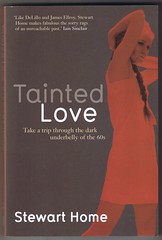scarecrow interviews

Thursday, February 23, 2006
Tony O'Neill Interview: Getting it down...
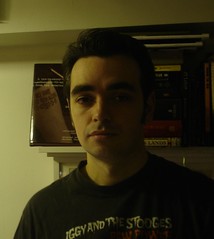
Lee Rourke: When and where was Digging the Vein written?
Tony O'Neill: I started writing Digging the Vein in London in early 2003. I had reached a point in my life were I felt as if I had hit a brick wall in many respects. I made the decision to come off of methadone and heroin because my life was a complete fucking mess. I had stopped writing altogether back in LA when I first got strung out. But back in London I was in a new relationship – with a non-addict – and suddenly my perception of myself started to alter radically. Up until then I had completely embraced the persona of the full-on junkie. That was all I aspired to being. I thought that anything else was a sell-out. I had abandoned music and all of the arts in favour of what I saw as the truest art form there was – getting high. But after Vanessa and I got together there was a real discord there between what I perceived of myself and how I really felt. Travelling to New York was one of the big deal breakers. Having to beg and cajole my clinic to give me enough methadone for the 7-day visit. In the end they refused and I had to buy a large amount of stuff off the black market and take it with me in a mouthwash bottle. I really felt like the walls were closing in on me and I wanted my freedom back. So that’s when I decided to try and withdraw from methadone again – and that’s why I started writing the book. The book – at the start – was literally something to do while I was detoxing. Something to keep me sane. And I started writing about incidents that I wasn’t proud of in my life, almost to purge them out of my system. And after a rickety start, I felt the words start to come. I felt like a retired boxer going back in the ring for one last fight. It started to come easier and easier. At the start I was sat by the computer, you know, in tears. Dope-sick. Shaking. Throwing up into trashcans. And getting it down a fucking word at a time. The depression lasted months. Months and months. And I wrote through it. There was no thought of publishing it at the start. It was just to keep myself sane. But once it started coming I couldn’t stop. I took a job at a music store in the basement of the Virgin Megastore on Oxford Street, when Vanessa was pregnant with Nico. And I’d disappear off, grab a bottle of cough medicine from the Boots around the corner, drink enough to feel normal and sit in the café during my lunch break writing the book onto napkins, or pieces of paper stolen out of the boss’s office. Then I’d go home and transcribe ‘em. And my excitement was building and building – and even though at the time it didn’t feel like it – my system was returning to normality for the first time in years. I finished the book 2 nights before Nico was born. And there it was – I had two babies.
T O'N: My time as a musician was certainly an interesting one. I got the gig playing keyboards for Marc Almond 2 days before I was due to start university. I didn’t show up, went to London for the audition instead. My stint in Kenickie ran pretty much parallel as Marc wasn’t playing too many live shows at the time. I could never do it for a living again. It encouraged all of the worst, most excessive parts of me. For me being a musician was unrelenting. You’d be touring for extended periods of time and it was all one big party. Then you’d be dropped off at home and have months of nothing. So you’d get wasted to fill the time in. Lauren, Emma and Marie from Kenickie were some of the coolest people I’d ever met. Really good people. Marc, well he was one of the brightest most fascinating people I have ever come across. But the label people, and my manager, and a lot of the peripheral people were fucking scumbags. Over in LA when I was playing it was always the business people who were the problem. So far I find writing to be far more satisfying if only on the superficial level of I don’t have to deal with a bunch of bastard cocksuckers to finish a book. Unless you’re U2, try and record an album for a major label, and you’ll have people in there and interfering on every level from morning to night. I suppose I have the benefit of being with people like Contemporary Press, who are a new outfit and genuinely good people who believe in the book. They are – in the most positive sense – the exact opposite of what dealing with a major house would be like. They go with their gut and they aren’t afraid to take risks. They were publishing kind of neo-pulp stuff, and took my book on even though it didn’t exactly fit into that mould. And that’s what makes a great company – they aren’t afraid, they take risks and they go with their gut. The UK edition is coming out on Wrecking Ball Press and it’s the same deal. They’re independent, they’re young, and they’re risk takers. I don’t have the energy to spend on people like my old managers any more. I’d rather go to fucking jail that be involved in the music industry again.
I was writing a lot before and during my time on the road. But I never had the time or the drive to follow through. And most of what I was writing was piss poor, in retrospect. I hadn’t hit upon the revelation: write what you know. I was always aping my heroes. I suppose it wasn’t until I was in a situation were I had nothing but a blank page in front of me and what felt like no way out, that I was able to produce something that I could be proud of.
LR: Your writing has been compared to Dan Fante, how does this sit with you and where do you feel the comparisons begin and end?
T O'N: Well, that’s a big compliment as far as I’m concerned. I don’t know who compared us – and it certainly wasn’t me, I wouldn’t dare – but I suppose any comparison might come from our emotional honesty. I wasn’t looking to glorify myself, or make myself look good. It was simply a matter of telling my story the best way I could. I had already started writing my book when I first read Dan Fante’s stuff, and I suppose the big drive it gave me was that it proved that good books – great books – were still getting published by someone. Because up until then all of my favourite authors were either dead or past their prime. So Chump Change – and all of the others – were kind of a revelation for me in that sense. But I feel that we’re different writers – we deal with different themes… but also, I’d hope that someone who really liked Dan’s writing might dig my stuff too.
LR: Whose writing could you seriously not live without?
T O'N: Well, for me the greatest is still William Burroughs. I have to be careful not be influenced too much by his style because it’s so distinctive, but his stuff… I can just dip in and out of my well-read copy of say Naked Lunch or Soft Machine and experience something new every time. I’ll never get tired of reading his stuff. I know there’s so much stuff tied up in the legend or the persona of the man, but strip all of that away and you still have one of the greatest minds of the 20th century.
LR: There is an underlying soundtrack running through Digging The Vein; do any particular songs say more to you than, say, a work of literary fiction ever could?
T O'N: Oh sure. They hit you in a different way. Some music is so literary – yet something about that perfect juxtaposition of words and music is incredibly powerful. There’s something more visceral about it. They say something different to me than a work of literary fiction could, but that works vice versa too. But some of the best stuff of say The Clash, Lou Reed… I mean ‘Berlin’ is one of my favourite albums, so stunning and literary in its scope. And the music is perfect, perfect. Or Tom Waits. His stuff can be as evocative of a time and a place as any work of literature. But that said there’s no musical comparison for something like Celine, or Burroughs, Fante either. I dunno, I can only think of the 2 being exactly comparable in a negative sense. Say Coldplay and Zadie Smith.
LR: The James Frey debacle. Discuss?
T O'N: Well that’s a funny one for me. I’d never heard of James Frey and then I came to the states and suddenly everybody’s talking about this book about an ex-addict who quit without the aid of AA or NA… which was unusual in this kind of book and similar territory to my own… and then he’s on Oprah, and then he’s number one… and I tried to read the book, but… I don’t like that kind of stuff. I never wanted mine marketed as a memoir, it’s too obvious and it takes some of the art out of it for me. I mean Bukowski’s novels were broadly autobiographical, but they weren’t sold as memoirs. This insistence of labelling books like this shows more about the lack of imagination of modern readers and publishers than anything else. But after picking up the book I really didn’t like his writing, and it boggled my mind all the attention he was getting. And then, boom, it all collapses around him. It’s hard to pick sides because I have no more sympathy for the Oprah side of the argument that I have for Frey. I mean, fuck Oprah Winfrey, it’s sad to me that in America a book goes to number one because a fucking chat show host endorses it. I mean who cares what she thinks? And then for her to act as if Frey personally insulted her by lying in the book… I was just struck by how ugly and massive her ego is. But Frey, I think he’s a second rate writer to be frank, and I think the things he lied about are so petty as to be comical. Acting like he was a hard man because to took on some cops and spent a week in jail. Listen, if you’re a crack head you ain't gonna do NOTHING that’s gonna get between you and your next pipe. Nothing. Certainly not punching a fucking cop who has got a gun. Yes, the cops are assholes, but you still call them sir and play nice because unless you’ve got a bigger gun than them you ain't gonna win. I ate shit from the cops plenty, because my m.o. – and every junkie’s m.o. - is to get away without incident, go home and go fix. And I wasn’t afraid to put it in the book. When a cop kicked my ass outside of the emergency room I did nothing. Nothing. Because he’d either have shot me or locked me up. I stayed on my knees until he left and then I split. Why recast that in my book to make me look like some kind of hard man? I don’t have anything to prove to anyone reading my book. When you’re in the street drug scene in LA for a while, you don’t have to make shit up. The truth is bad enough.
LR: What next? Are you working on anything else? Many of your short stories and poems have been published both sides of the Atlantic (including here at scarecrow), are you currently compiling any collections for publication?
T O'N: I’m compiling a poetry collection for the US on a really great new indie press called Burning Shore Press, based out of Long Beach, CA. They’re putting out Dan Fante’s plays and they put out a really outstanding novel called “Heaping Stones” by a guy called Rob Woodard. So I was flattered that they wanted to put out my poetry, because I know poetry collections are not an easy sell. So in a way the poems evolved the same way my book did – I was just writing for myself. I again had no hopes of getting them published. But they give me a lot of satisfaction to write and now I’m very excited about the book (“Songs From The Shooting Gallery”). In the UK a really talented writer called Heidi James is starting a publishing house called Social Disease and we’re putting together a collection of poems and short stories. That one is still evolving because the material just keeps coming and so the title is still up in the air. But Heidi is a really great writer – extensively published on the web and in literary magazines – so it was very flattering for her to approach me about this. My big thing is my next novel. I’m trying to move away from writing about my own life and want to use those themes to create something much more expansive and challenging. I started work on a follow up; I’m about a third in. The interest in Digging the Vein has been a big motivating factor. I feel very proud and very lucky to even have a book out there – it’s such a tough industry. But I’ve always had that kind of pit pull attitude about things – I’m constantly pushing my stuff, looking for angles. Being a junkie was the best apprenticeship I could have asked for. I simply hustle like my next bag of smack is depending on it. I hustle relentlessly. And I’ve got to say, along with raising a daughter, it’s the most rewarding thing I’ve ever done with my life.
LR: Tony, thanks for your time.
